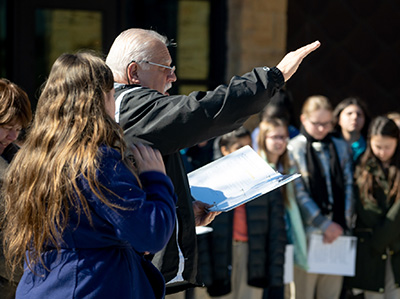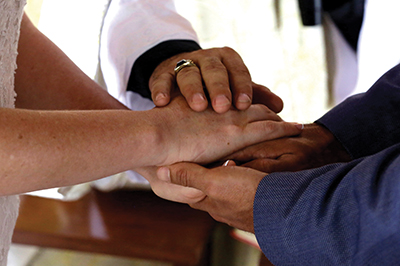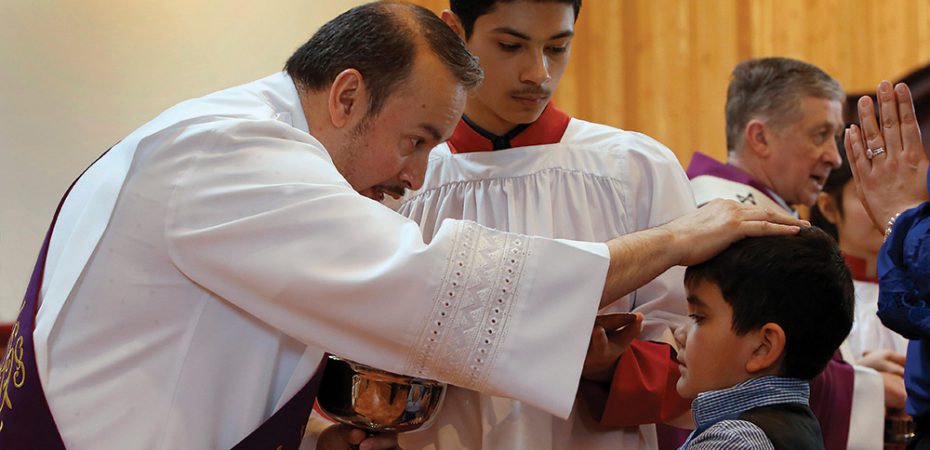God Bless You, Gesundheit, Salud!
When does a deacon offer a blessing and why?
Deacon Victor Puscas Comments Off on God Bless You, Gesundheit, Salud!
I remember it like it was yesterday. The first Mass I ever served as a deacon following ordination. Just before the entrance procession, the pastor leaned over to me and said, “You’re all full of the grace of holy orders … why don’t you give the final blessing at the end of Mass?” I wasn’t expecting this, but neither was I in a position to argue with him. According to liturgical norms, the final blessing is actually reserved only for the main celebrant. I should have respectfully declined because my blessing was actually illicit, but I didn’t know any better, and, after all, he was the boss.
The problem came at the next Mass the following week. This time it was a solemnity and the presider was the parochial vicar. Just before the entrance procession, he leaned over to me and said, “Give me a solemn blessing at the end please.”

Mistakenly, I assumed he meant that I was to again give the final blessing, but this time I was to do it solemnly. I guess that meant that I was supposed to look serious as I said a few words and traced a cross in the air with my hand. So … when the time came, I heard the priest say, “The Lord be with you.” The people said, “And with your Spirit.” I looked at the priest who nodded to me and with that gesture, I solemnly launched into, “May Almighty God …”
That’s when the priest interrupted me! He whispered loudly, “No, no, no, no! Say, ‘Bow down for the blessing.’” Shamefacedly, I repeated, “Bow down for the blessing,” and the Mass concluded in the normal way.
I was embarrassed, but I began to wonder about blessings. Who is supposed to give them and when and why? What about blessing someone who crosses her arms at communion? And, finally, let’s review, to some extent, the Vatican’s recent announcement about the question of blessing same-sex marriages?
Sacramentals
According to the United States Conference of Catholic Bishops (USCCB), blessings are called “sacramentals” because they prepare us to receive the grace of the sacraments (cf. Catechism of the Catholic Church, No. 1670)and help us to grow to be more like Christ. Blessings consist of prayer, Scripture and sometimes a special ritual sign (cf. No. 1668).
People are accustomed to seeing bishops, priests and deacons blessing objects or persons in the name of the Church. Indeed, “the more a blessing concerns ecclesial and sacramental life, the more its administration is reserved to the ordained ministry” (CCC, No. 1669), often with the participation of the local parish community gathered in prayer. Whenever an ordained minister is present, he should be called upon to give the blessing. Whenever there are a number of ordained ministers present, the highest-ranking member of the hierarchy of bishop, priest, deacon, should be called upon to give the blessing.
However, there are other blessings, like the ones contained in the “Catholic Household Blessings and Prayers” (Image, $10.99), that can be prayed by anyone who has been baptized, “in virtue of the universal priesthood, a dignity they possess because of their baptism and confirmation” (“Book of Blessings,” No. 18). The blessing given by laypersons is exercised because of their special office, such as parents on behalf of their children.
Right after telling his disciples to “love your enemies, do good to those who hate you,” Jesus instructs them to “bless those who curse you, pray for those who mistreat you” (Lk 6:28). St. Paul echoes the Lord’s command when he exhorts the Romans to “bless those who persecute [you], bless and do not curse them” (Rom 12:14). St. Peter urges that each time we are on the receiving end of evil, we should return “a blessing, because to this you were called, that you might inherit a blessing” (1 Pt 3:9). The Catechism of the Catholic Church tells us that “every baptized person is called to be a ‘blessing’ and to bless.” (No. 1669).
Blessing at Communion
However, a blessing at Communion is a different kind of blessing. Archbishop Charles Chaput wrote about the very common occurrence of children in line who have not yet received their first Communion, or adults who cross their arms indicating that they are not disposed to receive the Eucharist, who nonetheless receive a blessing from the Eucharistic minister.
As warm and well-intentioned as the gesture may be, Archbishop Chaput explains, in the context of the liturgy the Communion procession really isn’t the time for a blessing of children or adults who are unable to receive Communion, yet it has gained widespread acceptance. “The blessing of the assembly properly occurs at the end of the Mass. As the body of Christ, the assembly is blessed together before we depart to live the fruits of the liturgy.” Perhaps the better Communion practice is to simply say, “Receive Jesus in your heart,” and avoid blessing or touching the person.
Same-sex Marriages

All of the foregoing brings me to the thornier issue of the recent announcement by the Holy See that the Church cannot bless same-sex marriages. Why not? If we accept the proposition that we can bless anyone who comes up for a blessing at Communion, haven’t we already (probably) blessed gay people? Furthermore, if we have probably blessed one gay person at Communion, why can’t we bless two gay people in a same-sex union?
The Congregation for the Doctrine of the Faith (CDF) has weighed in on this issue. It all began with something called a dubium. The word dubium is a Latin word, which means “doubtful” or “uncertain.” For ecclesial purposes, it is a doctrinal question that is asked to the CDF, which later requires a responsa. Based on a recent Vatican News report, the Church, simply stated, does not have the power to bless same-sex unions. Such blessings therefore cannot “be considered licit,” according to the CDF. The responsa says it is not licit for priests to bless homosexual couples who ask for some type of religious recognition of their union. The CDF says Pope Francis was informed and “gave his assent” to the publication of the responsa and an accompanying explanatory note.
The document situates its responsa into the context of the “sincere desire to welcome and accompany homosexual persons, to whom are proposed paths of growth in faith,” as expressed also in the apostolic exhortation Amoris Laetitia, which speaks of “the assistance they [those who manifest a homosexual orientation] need to understand and fully carry out God’s will in their lives” (No. 250).
Responses
Fundamental to the CDF’s responsa is the distinction that must be made between “persons” and “union.” The negative response given to the blessing of a union does not, in fact, imply a judgment regarding the individuals involved, who must be welcomed “with respect, compassion, and sensitivity,” avoiding “every sign of unjust discrimination” as already written in magisterial documents.
These are the motivations based on the negative response. It regards the truth and value of blessings, which are “sacramentals,” liturgical actions of the Church, which require that what is being blessed be “objectively and positively ordered to receive and express grace, according to the designs of God inscribed in creation.” Relationships, even if stable, “that involve sexual activity outside of marriage” — meaning, outside the “indissoluble union of a man and a woman,” open to the transmission of life — do not respond to the “designs of God” even if “positive elements” are present in those relationships. This consideration not only concerns same-sex couples but also unions that involve sexual activity outside of matrimony. Another reason for the negative responsa is the risk that the blessing of same-sex unions may be mistakenly associated with that of the Sacrament of Matrimony. Interestingly enough, the word “matrimony” derives from an old French translation of two Latin words which means “the condition of becoming a mother.”
The CDF concludes by noting that the responsa to the dubium does not preclude “the blessings given to individual persons with homosexual inclinations, who manifest the will to live in fidelity to the revealed plans of God,” while it declares impermissible “any form of blessing that tends to acknowledge their unions as such.”
………………………………………………………………………………………………………………………………………………………….
Final Blessing
In the book “Go in Peace: A Gift of Enduring Love” (Loyola, $12.95), Pope St. John Paul II leaves readers with this prayer:
“That the Lord Jesus will reveal Himself to each one of you,
that He will give you the strength to go out and profess that you are Christian,
that He will show you that He alone can fill your hearts.
“Accept His freedom and embrace His truth,
and be messengers of the certainty that you have been truly liberated
through the death and resurrection of the Lord Jesus.
“This will be the new experience, the powerful experience,
that will generate, through you, a more just society and a better world.
“God bless you, and may the joy of Jesus be always with you. Amen.”
…………………………………………………………………………………………………………………………………………………………….
Dignity of Matrimony
The overarching concern appears to be the preservation of the importance and dignity of the Sacrament of Matrimony as it relates to the particular good of children, the natural creation of whom is impossible in a same-sex union. Indeed, the Praenotanda of the Order of Celebrating Matrimony and the Pastoral Constitution on the Church in the Modern World (Gaudium et Spes), both stress that “the institution of marriage itself and conjugal love are, by their very nature, ordered to the procreation and formation of children and find in them, as it were, their ultimate crown. Children are thus truly the supreme gift of marriage and contribute greatly to the good of the parents themselves.” Moreover, if an engaged couple openly and expressly demonstrates that they reject what the Church intends when the marriage of baptized persons is celebrated, the pastor of souls is not permitted to celebrate the sacrament or to solemnize the union through the nuptial blessing.
Concerns
Pastoral concerns make this a particularly thorny issue compounded by the dissent of some Church leaders. For example, Austria’s Cardinal Christoph Schönborn has said he cannot deny same-sex couples a blessing if they request one and that he was “not happy” with the Vatican’s mid-March statement on same-sex unions.
On March 24, 2021, the cardinal tweeted: “A mother will not deny her children a sincerely requested blessing. Neither will the mother church. Whether a church blessing is always the right form of expression is something that still needs to be given careful consideration.” He added that the Church is a teacher, but she is first of all a mother. That is why this declaration has hit many people so particularly painfully, because they have the feeling that they are being rejected by the Church … that they are somehow second-class Catholics.
On March 23, 2021, Bishop Josef Marketz of Gurk, Austria, said that he would defy the Vatican ban: “For me, homosexuals are not second-class Christians, and, of course, I will always give them a blessing.”
Bishop Georg Bätzing, head of the German bishops’ conference, said that in his capacity as bishop of Limburg he did not understand why the CDF issued the note. “A document that in its argumentation so blatantly closes its mind to a progress in knowledge of both a theological and human-scientific nature will lead to pastoral practice ignoring it,” the bishop said in a statement. He called for “a reassessment of same-sex partnerships and a further development of the Church’s sexual morality.”
The debate rages on, but even more importantly the positions of these bishops go against 2,000 years of Tradition and appear to be publicly aimed at embarrassing the CDF and the pope, not to mention the potential it has to the spread of scandal and confusion among the faithful.
One might argue that the Church is tone-deaf regarding homosexual Catholics, issuing this responsa without calculating the negative popular and media reactions that were sure to follow. On the other hand, the Church is not in the position of bowing and bending to the whims of culture. The Church is always seeking truth.
“‘What is truth?’ said jesting Pilate, and would not stay for an answer.” Such is Lord Bacon’s well-known interpretation of Pilate’s well-known question.
As for deacons, we are well-advised to always refer to official Church teaching when counseling same-sex couples. The deacon is also advised to work out the details of a final solemn blessing with the presider before Mass.
DEACON VICTOR PUSCAS the director of diaconate formation for the Diocese of Joliet, Illinois. He holds a D.Min. degree from Catholic Theological Union in Chicago.
…………………………………………………………………………………………………………………………………………………..
The Fourfold Franciscan Blessing
St. Francis of Assisi is credited for this uncomfortable invocation that is open to a more profound life in the Gospel:
May God bless you with discomfort, At easy answers, half-truths,
And superficial relationships So that you may live
Deep within your heart.
May God bless you with anger
At injustice, oppression,
And exploitation of people,
So that you may work for
Justice, freedom and peace.
May God bless you with tears,
To shed for those who suffer pain,
Rejection, hunger and war,
So that you may reach out your hand
To comfort them and
To turn their pain to joy
And may God bless you
With enough foolishness
To believe that you can
Make a difference in the world,
So that you can do
What others claim cannot be done
To bring justice and kindness
To all our children and the poor.
Amen
…………………………………………………………………………………………………………………………………………………..





